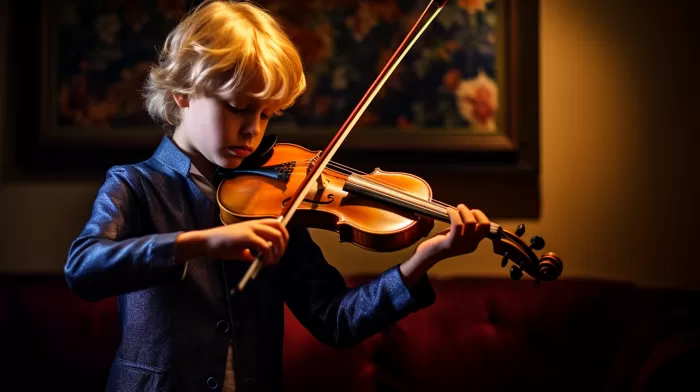Did you know that playing a musical instrument can significantly improve your brain function? Famous minds like Sherlock Holmes and Albert Einstein both enjoyed playing the violin to de-stress, and now researchers have discovered the optimal age range to start playing an instrument for the best brain benefits.
Strike a Chord Between Ages 6 and 8
Canadian researchers at Concordia University and McGill in Montreal have identified a “sensitive period” between the ages of 6 and 8 when musical training can have the most significant impact on brain development. During this time, playing an instrument can lead to long-lasting motor abilities and improved brain structure.
According to researcher Virginia Penhune, learning to play an instrument requires coordination between the hands and visual or auditory stimuli. Practicing an instrument before the age of 7 can boost the normal growth of connections between motor and sensory regions of the brain. These connections form the foundation for ongoing training and improvement.
A Study of Musical Minds
To better understand the impact of musical training on brain health, the researchers studied 36 adult musicians and conducted brain scans. Half of the participants had begun musical training before the age of 7, while the other half had started later; however, both groups had the same number of years of musical training and experience. The researchers then compared these two groups to individuals who had little or no formal musical training to study differences in motor skills and brain structure.
They found that musicians who began training before the age of 7 had more accurate timing after two days of practice. Additionally, these individuals showed enhanced white matter in the corpus callosum, a bundle of nerve fibers that connect the left and right motor regions of the brain. In fact, the data showed that the younger a person starts with music training, the greater the level of connectivity in the brain.
Study co-author Robert J. Zatorre stated that this research is significant because it shows that certain aspects of brain anatomy are more receptive to changes during early development, making musical training more effective for younger learners.
It’s Never Too Late to Play a New Tune
Does this mean that starting musical training past the age of 8 is pointless? Absolutely not! The lifelong benefits of learning to play an instrument are numerous, and it’s never too late to start.
Playing a musical instrument can improve memory, increase coordination, and reduce stress. Music has the power to engage almost every area of the brain and can even help to build neural connections, thus improving cognitive function throughout a person’s life.
For adults, learning to play an instrument can not only be a fun and engaging hobby, but it can also help to maintain or improve brain function as you get older. Many studies have shown that individuals who actively engage in challenging, novel activities like playing an instrument are more likely to maintain cognitive health during aging.
Encouraging the Next Generation of Musicians
Children are naturally curious and open to learning new skills, making it the perfect time to introduce them to the world of music. By starting musical training between the ages of 6 and 8, you can help your child build a strong foundation for brain health that lasts a lifetime.
As a parent, there are several ways you can encourage your child’s musical interests:
- Expose them to various genres of music from a young age. Help your child discover the beauty of classical, jazz, or world music to ignite their curiosity.
- Offer age-appropriate instruments, such as recorders, ukuleles, or xylophones, and encourage free play and exploration.
- Consider enrolling your child in formal music lessons. Apart from developing their motor and cognitive skills, music lessons can help children build discipline, resilience, and creativity.
- Attend live musical performances as a family. Experiencing the magic of live music can inspire a child’s lifelong love for playing instruments.
- Celebrate your child’s musical achievements, no matter how small. Encourage them to express their creativity and passion through music.
In conclusion, musical training at a young age can have significant lifelong benefits for brain health and cognitive function. However, for those who missed that window, it is never too late to start learning an instrument and reaping the numerous benefits. Encourage the children in your life to explore the world of music and enjoy the enhanced brain power that comes with playing an instrument.



